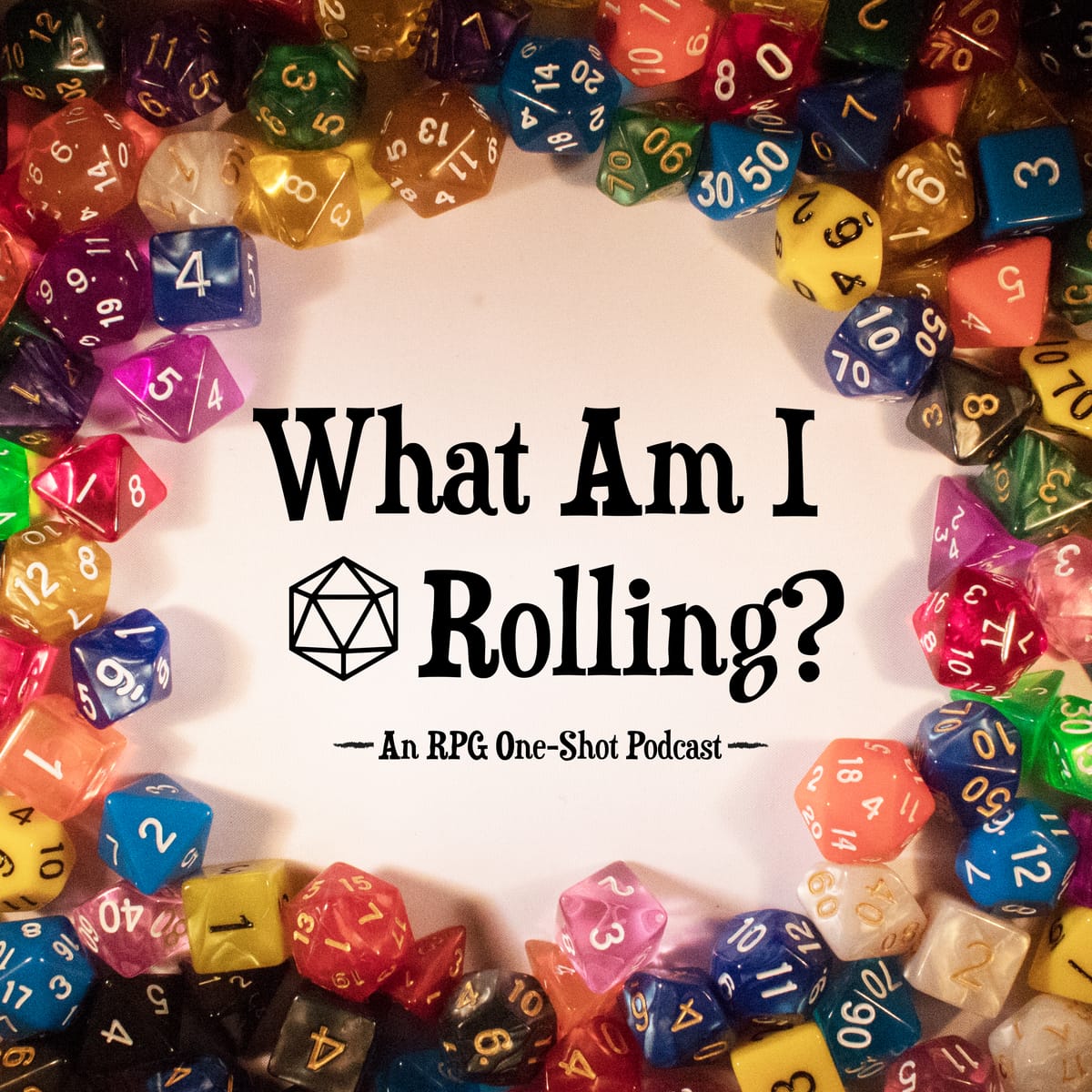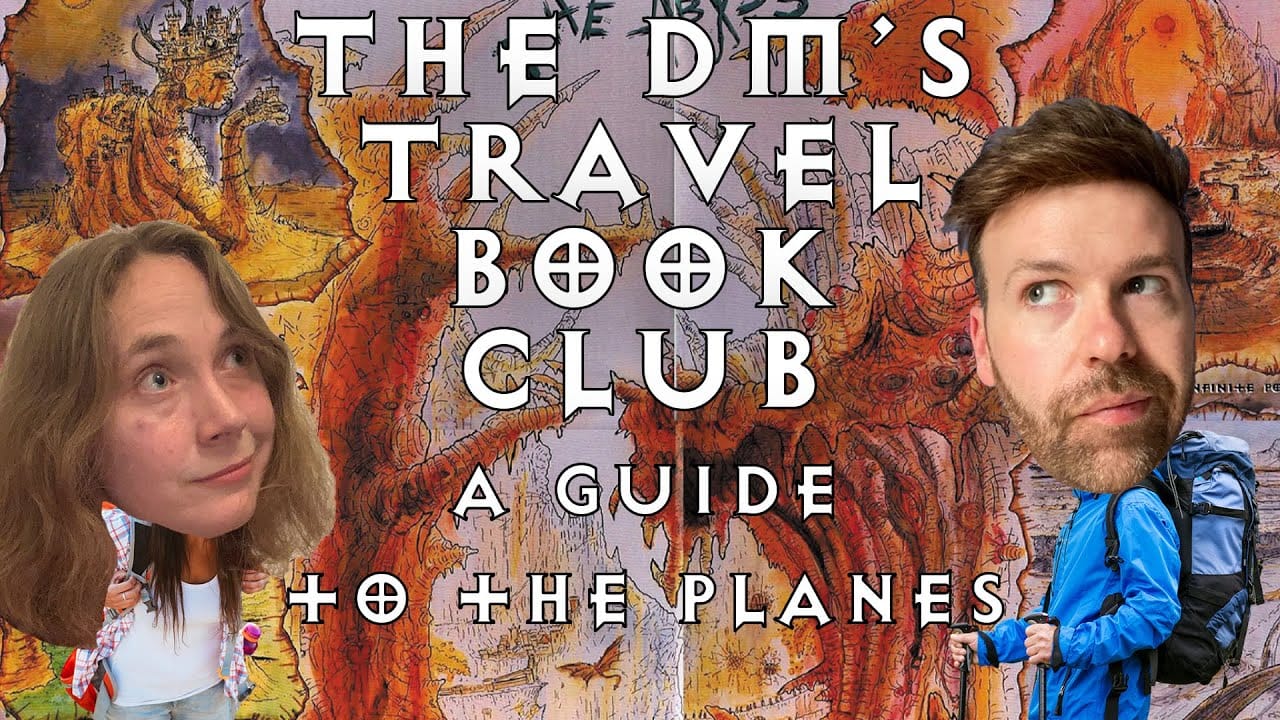
An actual play podcast with a difference, What Am I Rolling? sees host Fiona Howat and guests work their way through a multitude of different games, showcasing the wild diversity of RPGs today. We spoke to Fiona to find out what inspired her to start the show, how she manages to grapple with so many systems and what it’s taught her about being both a better player and GM.
Hi Fiona, so first things first, can you tell us a little bit about how you got into RPGs and what prompted the move behind the GM's screen?
Fiona Howat: Compared to other folks in the community, I actually got into RPGs quite late - about 7 years ago. I used to do a lot of sports and one evening I was invited over to try out the first D&D 5e starter set at a team mate’s house. Instantly I fell in love with it - just something about the game clicked in me as a wannabe theatre kid who loved video games and story telling.
I started looking up RPGs in general, wanting to know more, and amassed quite a collection of (unread) PDFs and rulebooks from a variety of Kickstarter campaigns.
I moved into GMing roughly about 6 months after starting out . Partly this was because of the podcast but also I was getting tired of the ‘backseat DMing’ phenomenon I had been experiencing in different gaming groups. A lot of experienced players I gamed with knew D&D’s rules inside and out and this often resulted in a lot of meta gaming and rules lawyering which impacted my enjoyment as a player at these sessions.
I was also getting a bit tired of the same old recycled stories and character tropes. I wanted to create and collaborate on stories which mattered and had players be active and make choices which made a difference rather than going through the motions. That’s when I decided to offer to run different RPG systems.
My mindset was ‘If you want something to happen, you are the first step in making it happen. Plus, no player would ever be able to ‘backseat DM’ me as I would be the only one who knew the rules!’
The podcast has a fairly noticeable difference to a lot of actual play shows in that you don’t stick to one game or ongoing story line. What inspired you to create the show in the first place and in the format you did?
FH: So along with moving into a GM role and offering to run different RPG systems, I also wanted to expand my skills as a content creator. I work in higher education and my role mainly focuses on creating video content for healthcare courses.
I have always listened to a lot of podcasts and wanted to show educators I work with that audio was an easier alternative way to creating learning resources compared to video, as realistically, you only need a good microphone to start creating your own audio content.
So, as part of my training, I went to a podcast workshop and by the end of the session, I was inspired to just start making my own content and got to work straight away when I got home.
In terms of why I make WAIR the way I do? That’s an interesting question.
There’s hundreds of RPG actual play podcasts out there and there was a crippling fear at the beginning that my idea had already been done. I wasn’t doing anything new or exciting, especially when you have folks like OneShot Podcast or Glass Canon Network who have dominated the field for a long time.
But, at the same time, I realised I wanted to make a RPG podcast that I, as a GM, would want to listen to and learn from. A podcast which actually talks about the main game mechanics in a short succinct way at the top of each episode (you would be surprised how many actual plays don’t do that!) and then showcases those mechanics in an entertaining and memorable way over 2-3 episodes.
At the end of the day, WAIR had always about featuring different systems and different stories over than having a regular cast or featuring celebrities who might be dipping in and out of gaming.
WAIR is a learning resource from which players and GMs can pick and choose what games they want to listen to rather than listening to every single episode in order. I want people to listen to an episode, be inspired to pick up the game we featured and then run it for their own group.
You’ve now made over 100 shows since 2018, do you know how many different games you've played in that time?
FH: I have just run over 50 different game systems for the podcast,minus a couple of one-shots where we had guest GMs come in and run games. I am quite proud of the range of systems we’ve featured, from heavily narrative improvisational games to super ‘crunchy’ mechanical games with lots of dice.
We have also featured games which have varying player group sizes to demonstrate different story dynamics; from big 6 player epics to intimate two player sessions. I have even showcased several solo RPG games as it’s a rapidly growing section in the community, and not too many actual plays of one player RPG games out there currently.
How do you choose which games to feature on the show?
FH: There’s no method to my madness when it comes to choosing which games to feature! As it is mostly a one-woman production it often ends up on whether or not I am excited by the game’s initial premise or core game mechanic.
The only rule I have is that the game is not D&D or relies heavily on the 5E ruleset. That said, I have featured D&D twice - Tomb of Horror one shot early on, and a bonus episode where my partner ran a one shot to propose to me and I unwittingly recorded it!
The biggest pull, for me, is if the RPG has a good quickstart version I can share with the players to help them during the game. Bonus points if there is a beginning scenario from which I can pull inspiration from.
Otherwise, I would always go for game mechanics over the setting where possible. I often find that game mechanics are designed to tell specific kinds of stories which I would not have considered. For example, Brindlewood Bay and The Between, both by the wonderful Jason Cordova, are very structured which produces really fun and engaging mystery stories that vary wildly in theme. Elderly women solving crime and victorian monster hunters respectively!
Of the many games you've featured which ones have surprised you most and really stuck in the mind?
FH: The one that surprised me the most was Jay Dragon’s Sleepaway - a Belonging Outside Belonging game about a group of summer camp counselors, guarding their wards against the nightmarish Lindworm.
I went into our recording with no expectations and was blown away by how impactful the story became. The way the players came together and discovered what was happening just through simple conversations, driven by moves and tokens - I had never played anything like it before.
At the end of the recording, I had a good old cathartic cry as our story unexpectedly hit home. Since then, I have become a massive fan of Jay’s RPG company Possum Creek Games and had a similarly enjoyable experience with their upcoming game Yazeba’s Bed & Breakfast - a slice-of-life TTRPG about a family of misfits residing in a witch’s house.
Between the actual play shows, you been interviewing game designers, has speaking to the people behind some of the RPGs you've played made you look at them differently?
FH: As someone who thoroughly enjoys nerding out about how game mechanics work, it’s always feels very cool to talk to designers about their passion projects; how they came up with their initial idea and then developed it in to a fully fledged game. I genuinely feel like an fan meeting their favourite author at a book signing!
I always ask my guests what advice they would give someone who wanted to run their game and their responses do have an impact on my own GMing style.
One of my earliest interviewees, Zach Cox from Soul Muppet Gaming, said doing an improv class or two would really add to running any RPG game and I took that very much to heart, having now become a professional improviser regularly performing in shows and at festivals.
Recently, Ferruccio Argento from Dicetale Games, talked about transparency in games and how GMs should purposefully state what the difficulty of tasks are out loud rather than keep it hidden from the players to enhance the story experience. I’ve started implementing this too and it’s really made a big difference in my games, especially in the ALIEN campaign I’m currently running on Girls Run These Worlds.

With over 100 shows now, where would you recommend someone new to the show start? Is there a particular episode you think sums up the vibe and is a good place to dive in?
FH: Hahaha! Honestly, the boring answer is search for a RPG title which interests you or system you want to run yourself and go from there! It’s definitely designed to be a ‘Pic ‘n’ Mix’ actual play podcast, where people could cherry pick what sessions they want to listen to.
If you are looking for something completely different to the usual high fantasy which most actual plays are about, then I would recommend the one shots I did with one of my best friends David playing Mars Colony (ep 53 - 54) and Mars Colony: 39 Dark (ep. 93 - 96), a 2 player sci-fi political drama by Tim C Koppang.
I am incredibly proud of the stories we created in those two sessions. Both of those games where recorded in a time of great political upheaval in the UK and it felt so good to create a story which felt very relevant to the times we were both living in.
If gritty sci fi drama isn’t your cup of tea, then the other recommendation is You Awaken In A Strange Place (ep. 101 & ArchaeoGaming Con 2022 Livestream), a fully improvised roleplaying game for 4 players designed by Jacob Andrews. You literally make the adventure, the setting, the characters - everything - on the fly by the players’ suggestions. It’s very chaotic but so much fun!
One of the most common reasons we hear for people not wanting to move away from D&D is that they don't want to have to learn a new system. As someone who wraps their head around new ones on a fortnightly basis, what advice would you give?
FH: Thankfully, I create enough of a backlog of episodes that I don’t need to learn a new system every two weeks! That would indeed be nightmarish!
But, I think there can be so much gained from exploring different RPG systems, both as a player and as a GM. I personally feel the current D&D rule set can only create certain kinds of story, aka the big fantasy epics of good vs evil. Even if you try to tell different stories through it they don’t necessarily have the same impact compared to systems specifically designed to tell those stories.
My advice would be to look at the quickstarts of other RPG systems where the genre interests you. Quickstarts have all the basic rules you need to get going and often include pre-generated characters or a simplified character creation process and a starting scenario. They’re a cheap investment and allow you to explore more systems without necessarily committing a lot of time and energy to learning a whole new system.
If you are not sure what genre you want to try I always recommend checking out Grant Howitt’s one-page games on his Patreon. Most people will have heard of Honey Heist as it featured several times on Critical Role but he has a variety of different and very silly one shots, all of which have easy-to-learn mechanics and always guarantee a fun gaming experience. My particular favourites include Jason Statham’s Big Vacation, Nice Marines, and Goat Crashers.
Considering the recent OGL scandal with Wizards of the Coast earlier this year and the upcoming ORC license from Paizo, there are going to be a lot of exciting new games out there in the RPG community, so there is no better time than now to try a different system and support up and coming game designers.
What tips would you give to someone who wants to introduce a new game to their group?
FH: First, think about what genre and tone of game your players like playing. Are they fully into the High Fantasy/Adventure genre? Or do they like sci fi or horror? Perhaps even romantic comedy or film noir/mystery? Finding a story or a setting they want to play in and explore is half the battle in my experience! Remember, you are a player too!
Second, give yourself and the players a set number of sessions to try out the new system and stick to it. I say 2-3 sessions if you are just trying out a game for the first time and testing the waters. Then, at the end, you can review if this is something your group wants to keep trying out or look for something else. It might also encourage other players to have a go at running a limited campaign of a system themselves.
Third, be flexible and forgiving. Players HATE change and going outside of their comfort zone if not supported. So make it easier for them. Give them a quick reference document with the mechanics in from them to look at, do character creation together or give out pre-gens, make sure any digital tools are accessible, encourage questions during the game and so on.
Really focus on removing these barriers so they get to learning and playing the new system quicker. If a player doesn’t like the way their character works, be open for them to switch powers or change characters after a session.
Ultimately, it’s about having that open dialogue with your players about wanting to try something different and then giving the tools to make the change as easy as possible. It doesn’t mean players will want to keep playing the new system but it’s a start in the right direction!
Looking back over 100+ shows what are the key lessons you've learned about running RPGs?
FH: You always did the best you could. No matter if you thought you did an amazing job running the game or if you forgot everything or you are beating yourself up because you forgot one rule. You did great.
Do session 0. Normalise going over the safety tools available and doing a boundaries check with all the players. RPG safety admin is important for everyone but especially for you as the GM.
If you are worried about having all the good player energy being sucked out of the room by doing the safety and boundaries talk, because such talk can do that, follow that up with a foundaries check, i.e. ask the players what they want to see happen in the game or what’s one thing which would bring them joy. Then all the players can be on the lookout for those elements in the game and help bring them about!
If you need to look up something like a rule or a stat block, give yourself 30 seconds to find it. If you can’t find it after 30 seconds, go with your gut and make the decision. You can always look it up after the game so you know for next time if you want but I give you full permission to ignore the rules in order to keep the game moving forward.
You have a background in improv and acting, useful in this game, and coming up you're hosting an online class showing how those skills can make you a better role-player. Can you give us a sneak peak of what that class might involve?
FH: Haha! Indeed - I will be teaching ‘Roll Initiative! Roleplaying for improvisers’ workshops aimed at both players and GMs for Queen City Comedy in April this year. It’s my first time being an improv facilitator so I’m very glad I was asked to teach on a topic very dear to my heart!
In our player edition workshop, we will be focusing on developing extraordinary characters, making creative choices in our scene work and engaging in collaborative storytelling with the rest of your gaming group. For our GM edition workshop, we will be looking specifically at world-building, scene painting and creating supporting characters such as quest givers and villains.
Note, you do not have to have any previous RPG or Improv experience to take part in these workshops. Just be ready to jump in!
My top tip for being a better role-player is two fold:
Listen (with a capital L). Active listening will help you understand the choices being made by others around the table and also help inform you in deciding what choice will serve the scene or the story the most. This is the most important tool in your player and GM tool-belt so keep it sharp!
Then, make the obvious choice. Too often, we get bogged down with asking questions because we don’t have enough information to solve the encounter presented and don’t move forward until every avenue is exhausted. Or, we try to be deliberately witty, funny or clever and do something outlandish or out of context, which derails the story. Simply, build upon what you have heard so far and ‘fill in the gaps’ as if your brain has an auto fill function. The story will move forward, often in unexpected but delightful ways, as a result!
As well as WAIR, you’re increasingly busy DMing on other people's shows, do you get much of a chance to step in front of the screen now or are you doomed to be a Forever GM?
FH: Haha! I don’t mind being thought of as a ‘forever GM’ if I am honest. Especially because I made the decision early on to not tie myself down to one system or game. At the end of the day, the GM’s also a player in every game they run. They just have the additional ability of ‘having the last word!’
If that wasn't enough you've also started another podcast The DM's Book Club, which has more of a D&D focus, what can you tell us about that?
FH: The DM’s Book Club is a weekly book club podcast where my cohost Hamilton and I take a D&D topic and discuss how we would implement it in our roleplaying campaigns.
The original idea was initially born out of trying to keep myself creative during the pandemic. During the UK lockdowns, I lost all enthusiasm for reading for pleasure so I started reading my non fiction RPG books and taking notes.
I realised there wasn’t a podcast aimed directly at Dungeon Masters who wanted learn the ins and outs of the current D&D rule set (there are of course many general D&D discussion podcasts but nothing specific).
More importantly, I wanted to create a podcast where we the cohosts would offer alternative suggestions to how we would implement or change rules or of elements of an adventure and give DMs of any level of experience the permission to ‘break’ the rules as they see fit and try something new.
We are just going into our 5th series now and have covered a whole range of topics, from how to create your own dungeon using the Dungeon Masters’ Guide to who we would cast in the ultimate D&D film featuring all our famous villains and NPCs.
We also developed a spin off show called The DM’s Travel Book Club where we explore all 16 planes of existences as outlined in D&D’s great wheel cosmology. Given the announcement of the Planescape setting returning to 5e at the end of the year, It’s been exciting to be ahead of curve!

Is there anything else coming up this year that we should be looking out for?
Yes! RPG/Podcast wise - I am in the process of putting together The GM’s Book Club, where my cohost Hamilton and I take a roleplaying game, read it cover to cover and rate, review and discuss our thoughts about it. Essentially we are expanding on from The DM’s Book Club, which will still keep going, just so we can reach a wider RPG audience, especially after the OGL news.
I am also planning to launch a dedicated discord server for WAIR and related podcasts soon as well as a regular newsletter about all the weird and wonderful stuff I get up to as a improviser and as a professional GM, it’s a lot and even I can’t keep up with it all!. Future plans involve attending some improv festivals as well as putting on more RPG specific workshops for improvisers.
In the meantime, would recommend following WAIR’s linktr.ee and socials as those are the best places to keep up with all my RPG shenanigans.
And finally if the game of RPG musical chairs did ever have to stop and you were stuck with one system for the rest of all time, what would you choose?
FH: Haha! I think I would have to cheat and make it a system of my own design! I struggle to pick favourites so, thanks to the new ORC license, maybe I would have a go at designing my own system and use the mechanics freely available which interest me for a basis! A cop-out but one I could very well do one day!
For all things What Am I Rolling? head to linktr.ee/wair_podcast
This feature originally appeared in Wyrd Science Vol.1, Issue 4 (April '23)

